- Home
- Allen Wold
Lair of the Cyclops
Lair of the Cyclops Read online
Lair
of the
Cyclops
Rikard Braeth
Book III
Allen Wold
Also by Allen L. Wold
Jewels of the Dragon
Crown of the Serpent
In those areas where intellect, and cultural integrity, proved strong, the differing species and cultures learned to get along somehow, though not without their wars and struggles. Where a culture was immature, or an intellect incomplete, a species usually died, exterminated by its adversaries. In the time of the Federation, most star nations were stable, and genocidal conflict was confined to only those systems where new species were first emerging into starflight, and then only if older and wiser people could not prevent the slaughter.
The Federation, however, was exceptional even so. It had far less than its share of troubles, compared with the other star nations. There was crime, of course, but that is a personal and individual aberration. There were governmental, philosophical, and artistic differences, of course, but they seldom caused any overt violence. Tolerance between differing species was extremely high in the Federation, and even similar and hence competing cultures tended to try to find some compromise to their mutual benefit. Some scholars speculated that it was the continuing influence of the M'Kade, whose advent some thousand standard years ago had brought about the current form of government known as the Federation, which was responsible for this enviable condition; others that it was something intrinsic in the stars themselves, similar to that which promoted life in the first place.
There were exceptions, of course. Frequently conflicts arose between peoples who were so similar to each other that an outsider couldn't have told the difference. Sometimes war broke out within a single culture, which fought with itself far more bitterly than it ever had with anybody else. But these were the exceptions, and in other star nations were both more common and more violent. In large, the Federation was the epitome of peaceful coexistence.
Contents
Trokarion
1
2
3
Mensenear
Dannon's Keep
1
2
3
Malvrone
Tsikashka
1
2
3
Tarantor
DRG-17.iv
Malvrone
1
2
Trokarion
1
2
3
Trokarion
1
In the pitch-darkness a blinding spark of white light appeared, at about head level, slicing down, leaving behind it an intensely glowing wormtrail of molten stone and metal. A second cutting torch began working at the same point as the first, slicing horizontally. As the two spots of fire moved, the cuts behind them cooled and dimmed, but still light shone through from the illuminated chamber beyond.
The first torch finished its long downward stroke and started to cut across the bottom, just as the second torch turned its comer and started down the other side. The first torch finished and winked out just before the second met it. The cut panel fell into the darkness with a shattering crash.
Two furry beings, clutching cutting torches, filled most of the impromptu doorway, silhouetted by the light from the chamber behind them. Their bodies were spherical, with no apparent heads. Four dog legs radiated from the lower portion of their bodies, and there were two arms, one on either side of the upper portion. They began to stow their equipment into carrying cases, sitting on the stone floor behind them, which cases also held their power packs, attached to the wands by heavy cables.
They wore no clothes, only a simple harness over their thick fur, a harness that supported pouches in lieu of pockets. The fur of one was black, of the other mahogany. Their bare dog feet each ended in two huge yellow talons, easily eight centimeters long, and their hands, working with the precision of long practice, had two fingers and one thumb, almost as formidably taloned as their feet.
The area in which they worked, illuminated by unseen lamps off to the right, was made of crudely dressed stone, and looked like nothing so much as a pre-steam-age sewer. Shadows shifted, greatly elongated, on the wall behind the two workers. There were other people present.
When the cutting torches were properly packed the two workers helped each other set the heavy cases onto their backs, hooked on to studs on their harnesses, right behind the heavily lidded, half-dome eyes that bulged up through the fur on the top of their spherical bodies. The eyes were green, as big as a Human fist, with round black pupils. Their mouths were twenty-centimeter-long gashes, just forward of and below the eyes, thickly lipped, and with fangs ten centimeters long projecting in a downward curve from each corner.
The black-furred one stepped away from the doorway for a moment and came back with two powerful battery lamps and handed one to the mahogany-furred being. The space behind them did not grow appreciably darker, there were other lamps in the care of the people behind them.
The two shone the lamps into the darkness. The room now revealed was only four or five meters on a side, and completely bare. The material of the walls—stone? plastic? concrete?—was blackened as if by great heat, and irregularly corrugated as if compressed by great pressure. The wall through which the two furry, spherical beings had cut was the most distorted, especially near the ceiling that sloped down there, tinged with white along the join, and streaked with dark, grainy iridescent colors where the chemical composition of the structural material had been transformed by the heat.
After only a moment's hesitation the two workers stepped through the newly cut portal and to either side, set down their lamps so that they illuminated the larger portion of the chamber, and began moving aside the rubble of the fallen section of wall. As they worked, a shadow separated itself from the others cast on the primitive stone wall beyond the opening, and a Human stepped up to the new threshold and stood watching.
He was taller than average by some centimeters, slender, and he moved with an easy grace, indeed seemed graceful even when he was standing still. He was not exactly handsome, but then it was hard to tell with the bizarre helmet that covered his head and the left side of his face down to his chin. Over his left eye was a camera turret, the wide-angle lense now in place, the focus working almost silently, controlled by direct neuro-connections. The ear on that side was covered by a microphone complex, with precision-close, general-surround, and directional long-range mikes, chosen at the wearer's option, just like the camera lenses. A smaller mike curved around from his cheek to just in front of his mouth.
He was dressed in leathers and so, in spite of the recording helmet, couldn't be mistaken for a mere reporter. These unusual clothes consisted of a well-fitting pseudo-leather jacket—perhaps a bit long below the belt, with fancy stitching across the shoulders—and leather pants, snug but supple, tucked into calf-high boots, all of a rich tan color. He also wore heavy gauntleted gloves, of the same make and design, and on his hip there was a holster, in which snuggled the heaviest caliber revolver made in the Federation, the usually illegal, six-shot, .75 megatron. Not a reporter's weapon at all.
The shadows behind him moved again, and another figure came to the portal, humanoid in appearance but with movements that were simultaneously fluid and clumsy, suggesting otherwise. Its clothing was a loose-fitting gray jacket and full-cut trousers that seemed designed to conceal its form and hence its species. Its head was wrapped in gray, as was its face. Goggles covered its eyes, and a translating vocalizer covered the area where its mouth and nose might be expected to be.
"The stories would appear to be true," it said. Its tone was completely neutral, completely mechanical, with no hint of what ki
nd of vocal apparatus might have produced it, though its pitch suggested a masculine gender.
"Of course they are," said another of the four-legged, spherical furry beings, who had come up to stand behind the gray-clad humanoid. His fur was a dark brick color, his eyes slightly more yellow than those of the two workers, and unlike them his black leather harness supported, along with the power pack and such, a holstered pistol, pen recorder, communications equipment, and other things the nature and purpose of which could not be immediately determined by the casual observer. He pushed his way past the gray one as if he didn't want to touch him, but stopped short behind the tall Human who was still recording every inch of mis small chamber. The workers finished clearing the rubble, picked up their lamps, and stood on either side of the opening as if awaiting further instructions.
The tall man stepped forward first, followed and flanked by the gray one and the Kelarine supervisor, whose heavy toe talons clicked harshly on the heat-distorted floor as he walked. Then the portal behind them was darkened as a gigantic figure moved into the opening.
Its torso, bronze and green and deep blue, was, from top shoulder to waist, almost as tall as the individual in loose gray standing in front of it. A thick neck supported a head that was both wolflike and snakelike, with small bat ears set high on either side, domed eyes, and fangs that extended well below his lower jaw. On his head he wore a crownlike device, a circlet of black metal with curved spikes just in front of his tall, pointed ears.
He had four arms, one pair above the other, each longer than an average Human is tall, longer even than the man in leather. One huge hand carried a large case by straps, another held a device as big as a chain saw but without the chain of teeth and with a grip that fit his hand perfectly. In a third hand he carried a tapering staff, some two and a half meters long, with a knob at one end and a blunt point at the other, and in his fourth was a special lamp that shone with the light of wavelengths subtly different from those of the other lamps, less yellow and more blue and red at the same time, as if his eyes had evolved under a bizarrely different sun. And below his waist he had not legs but meter after meter of thick serpentine coils, bigger around than a Kelarin, extending back beyond the portal and out of sight.
"What do you think, Droagn," the man said, though he didn't look around.
"I can't tell," the creature projected. He did not vocalize, but used a special kind of telepathy that was comprehensible by all present, though the language he used had not been heard in this part of the galaxy for over fifty thousand years. "Even if this were Ahmear work, there's nothing left to prove it."
If the Kelarine supervisor had been a bit fastidious about getting too near the gray-clad humanoid, he was absolutely wary of the serpentine Ahmear. His ancestors had known the Ahmear, before that species had left this part of the galaxy so many aeons ago, and not all of the stories and legends that had been passed down were of the kind to instill confidence in the presence of this being, a freak survivor, unique within the Federation or any other star nation with which the Federation had general communication.
So the Kelarin kept well to one side as Droagn slid through the portal to join the others—or at least most of him did.
The two Kelarine workers moved across the room as the three came in, and when Droagn was fully within, two other Kelarins, one black, the other a pale terra-cotta with amber shading, came to the hole in the wall, carrying a variety of equipment and the last two lamps. In other circumstances they might have been considered tough characters who could take care of themselves and were equal to whatever situation in which they might find themselves. But keeping company with the Ahmear, a creature from their past thought mythical by most and demonic by some, made them more than a little cautious. They kept well clear of Droagn's slightly twitching tail tip.
There was no door set into the archway on the far side of the room, and only blackness beyond. The two lead Kelarins carried their lamps toward it while the tall Human followed gracefully behind. It was he who gave direction to the group, though without speaking, and the rest of his party accommodated him as they followed.
The next chamber was larger than the first, just as empty, just as discolored and distorted. "Gh'a-vaan ge'shlathik," the Ahmear said, actually vocalized, as he came through the arch.
The man turned and looked up at him, surprised by this revelation of his companion's excitement. "What was that again?"
"Sorry," Droagn answered, "I just said, 'This really feels weird.'"
"That's what I thought you said," the man replied, and turned back to his recording.
He was thorough in his work, but even the most complete recording of an empty chamber cannot take long. The only thing to see here, opposite this open portal, was a closed door, twisted and warped by the same volcanic heat that had distorted everything else. The two Kelarins with the cutting torches did not need spoken instructions. They went to the doorway and started setting up their equipment again.
But Droagn just snorted and slithered toward them. They quickly backed out of his way, their green eyes glittering overlarge in the reflected light of their lamps. The Ahmear put down his own lamp and the strap-bound case, pressed his two huge upper hands against the door, and pushed. The material of the door was a lot more fragile than it had appeared, weakened by heat and time, so that it crumbled with his first effort. Droagn coiled back and let the hired workers clear the rubble.
Beyond was a broad corridor, going to right and left. It was twisted and warped, as if the underlying structure of the building had suffered far more damage than was suggested by what they had so far seen.
The two workers shone their lamps, one in each direction. The tall man, with the gray-clad humanoid beside him, looked first down to the right. Some meters away a tongue of solidified lava protruded into the hall from what had once been a doorway. Beyond it another intrusion had been forced through a narrow crack in the wall. Farther on the shadows were too dark to tell.
To the left were other, similar intrusions. The black stone was frothy, streaked with white, sometimes half cutting off the corridor, and one tongue of lava dripped down from a gap in the ceiling, like some petrified theatrical curtain.
The Ahmear pushed through the door and paused a moment, looking first one way, then the other, while the tall man on his right, and the gray one on his left, waited patiently. "That way," he projected at last, pointing to the right. "The other way around is more direct, but the corridor is completely blocked off past the first turn." There was no visible clue as to how he came by this information.
There were other volcanic intrusions in the corridor past the first two, but nothing else. If there had once been any floor coveringx or wall covering, or furniture, or decorations, they had either been removed, or destroyed by the heat that had so warped and distorted the structure. Even so, the tall man recorded every step of the way, though he made his steps long and did not pause except once to duck under a tongue of black-foamed rock, its edges sharper than knives.
They came to a comer where the corridor turned to the left. There was less plastic deformation, but they still found intrusions and lava tongues from cracks in wall and ceiling, and once they came to a massive intrusion, from a doorway, that nearly closed off the corridor altogether.
Just past the second corner, on the inner side of the square that they were traversing, they came to an exceptionally large double door, set into a somewhat more elaborate jamb than normal, and here the leading workmen paused. Droagn came forward and put his huge hands against it to push it open, but this time the doors did not crumble or break. The Kelarins moved with a bit of a swagger as once again they set up their torches and started to cut. This time, however, they were working with security steel and not just structural materials and volcanic tuff.
At last the heavy doors fell away with a great crash and slid down a broad, steep ramp, which lay immediately beyond.
"It looks good, Rikard," the Ahmear said to the man. He gestured toward
the floor of the ramp. "Too coarse a texture for feet or wheels or sliders, but just right for 'snake bellies.'"
Rikard and Droagn stepped aside to allow the Kelarins to precede them down the ramp, but the workers held back, talking quietly among themselves. The terra-cotta one noticed Rikard looking at them, nudged the supervisor, and they all fell silent. Then the supervisor stepped up to Rikard.
"This is as far as we go," he said. "We're already way beyond our depth." A thick pink tongue flickered around his white fangs.
Rikard, taller than the Kelarin by a full head, just looked at him a moment. "That wasn't the deal, Kath Harin," he said.
"We've shown you into the ruins," Kath Harin said. "We can't give you any more guidance."
"You can carry the equipment. That's what you're being paid for too."
"Yeah, and it's enough for slog-work like that, and even enough for keeping Msr. Tail here company"—he flickered his huge yellow eyes at Droagn—"but just barely. But it's not enough for us to go down there." He jabbed at the doorway with a heavily clawed finger.
"If these ruins are authentic," the gray-clad humanoid said with his flat mechanical voice, "then what is there to be afraid of? This city has been buried for fifty thousand years."
"We had a deal," Rikard said to Kath Harin. "Ten kay apiece, down and out. If you won't come down, there'll be no pay coming out."
"And the sooner we go down," Droagn projected, "the sooner we'll be out. Let's do it."
The Kelarin paid no attention to him but looked at the tall Human instead. "Hell, Braeth, you owe us for what we've done so far anyway." He reached out a clawed hand, as if expecting coins to be dropped into it. The talons glinted in the light, long and strong and sharp enough to rip a man in half with one stroke.
Rikard Braeth's only response was to reach up with his left hand and carefully remove the optical helmet. His right hand, gloved and gauntleted, hung negligently by the butt of the heavy pistol on his hip. His face, now that it could be seen, was not homely, and was quite young—he was only thirty-one, given a Human life span of some two hundred years. His expression was bland, and his voice was neither loud nor soft as he said, "If I order a car and you deliver only the engine, you don't get paid until I get the rest. How do you want it?"

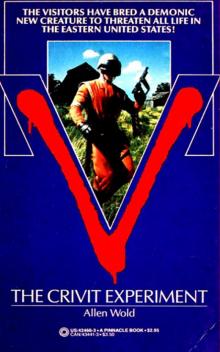 V: The Crivit Experiment
V: The Crivit Experiment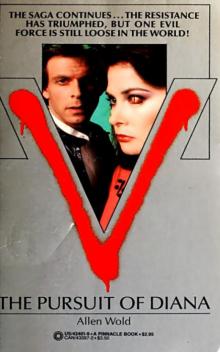 The Pursuit of Diana
The Pursuit of Diana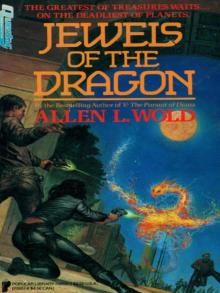 Jewels of the Dragon
Jewels of the Dragon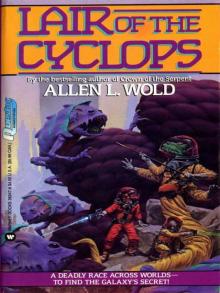 Lair of the Cyclops
Lair of the Cyclops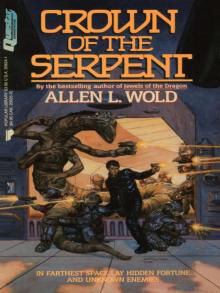 Crown of the Serpent
Crown of the Serpent